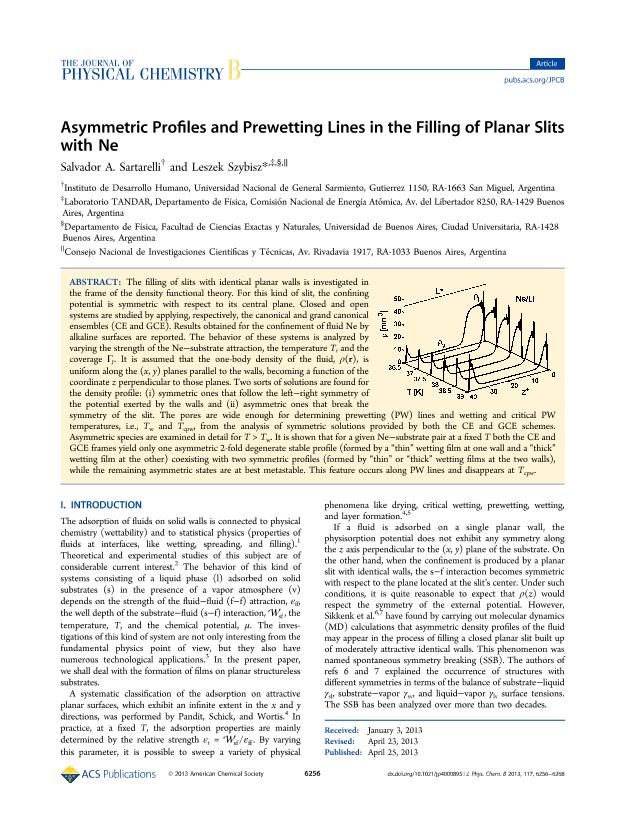Mostrar el registro sencillo del ítem
dc.contributor.author
Sartarelli, Salvador Andrés

dc.contributor.author
Szybisz, Leszek

dc.date.available
2017-09-12T17:37:31Z
dc.date.issued
2013-04
dc.identifier.citation
Sartarelli, Salvador Andrés; Szybisz, Leszek; Asymmetric profils and prewetting lines in the filling of planar slits with Ne; American Chemical Society; Journal of Physical Chemistry B; 117; 20; 4-2013; 6256-6268
dc.identifier.issn
1520-6106
dc.identifier.uri
http://hdl.handle.net/11336/24020
dc.description.abstract
The filling of slits with identical planar walls is investigated in the frame of the density functional theory. For this kind of slit, the confining potential is symmetric with respect to its central plane. Closed and open systems are studied by applying, respectively, the canonical and grand canonical ensembles (CE and GCE). Results obtained for the confinement of fluid Ne by alkaline surfaces are reported. The behavior of these systems is analyzed by varying the strength of the Ne–substrate attraction, the temperature T, and the coverage . It is assumed that the one-body density of the fluid, ρ(r), is uniform along the (x, y) planes parallel to the walls, becoming a function of the coordinate z perpendicular to those planes. Two sorts of solutions are found for the density profile: (i) symmetric ones that follow the left–right symmetry of the potential exerted by the walls and (ii) asymmetric ones that break the symmetry of the slit. The pores are wide enough for determining prewetting (PW) lines and wetting and critical PW temperatures, i.e., Tw and Tcpw, from the analysis of symmetric solutions provided by both the CE and GCE schemes. Asymmetric species are examined in detail for T > Tw. It is shown that for a given Ne–substrate pair at a fixed T both the CE and GCE frames yield only one asymmetric 2-fold degenerate stable profile (formed by a “thin” wetting film at one wall and a “thick” wetting film at the other) coexisting with two symmetric profiles (formed by “thin” or “thick” wetting films at the two walls), while the remaining asymmetric states are at best metastable. This feature occurs along PW lines and disappears at Tcpw.
dc.format
application/pdf
dc.language.iso
eng
dc.publisher
American Chemical Society

dc.rights
info:eu-repo/semantics/openAccess
dc.rights.uri
https://creativecommons.org/licenses/by-nc-sa/2.5/ar/
dc.subject
Confined Fluids
dc.subject
Prewetting Lines And Critical Temperatures
dc.subject
Density Profiles And Wetting Temperatures
dc.subject
Canonical And Grand Canonical Ensembles
dc.subject.classification
Otras Ciencias Físicas

dc.subject.classification
Ciencias Físicas

dc.subject.classification
CIENCIAS NATURALES Y EXACTAS

dc.title
Asymmetric profils and prewetting lines in the filling of planar slits with Ne
dc.type
info:eu-repo/semantics/article
dc.type
info:ar-repo/semantics/artículo
dc.type
info:eu-repo/semantics/publishedVersion
dc.date.updated
2017-09-12T16:30:13Z
dc.identifier.eissn
1520-5207
dc.journal.volume
117
dc.journal.number
20
dc.journal.pagination
6256-6268
dc.journal.pais
Estados Unidos

dc.journal.ciudad
Washington D. C.
dc.description.fil
Fil: Sartarelli, Salvador Andrés. Universidad Nacional de General Sarmiento. Instituto del Desarrollo Humano; Argentina
dc.description.fil
Fil: Szybisz, Leszek. Comisión Nacional de Energía Atómica. Gerencia del Área de Investigaciones y Aplicaciones No Nucleares. Gerencia de Física (Centro Atómico Constituyentes); Argentina. Comisión Nacional de Energía Atómica. Gerencia del Área de Investigación y Aplicaciones No Nucleares. Gerencia Física (Centro Atómico Constituyentes). Proyecto Tandar; Argentina. Universidad de Buenos Aires. Facultad de Ciencias Exactas y Naturales. Departamento de Física; Argentina. Consejo Nacional de Investigaciones Científicas y Técnicas; Argentina
dc.journal.title
Journal of Physical Chemistry B

dc.relation.alternativeid
info:eu-repo/semantics/altIdentifier/url/http://pubs.acs.org/doi/abs/10.1021/jp4000895
dc.relation.alternativeid
info:eu-repo/semantics/altIdentifier/doi/http://dx.doi.org/10.1021/jp4000895
Archivos asociados
